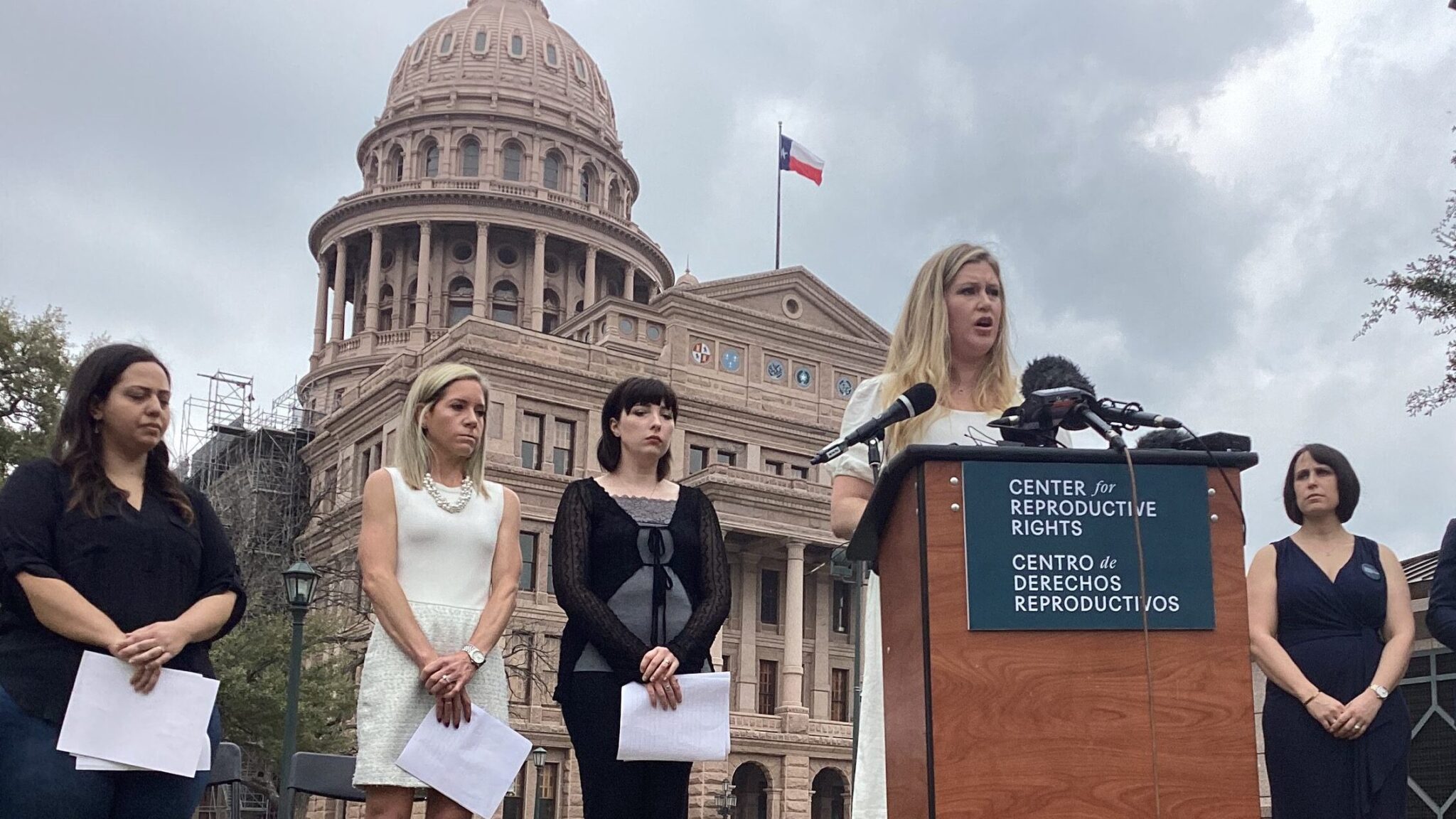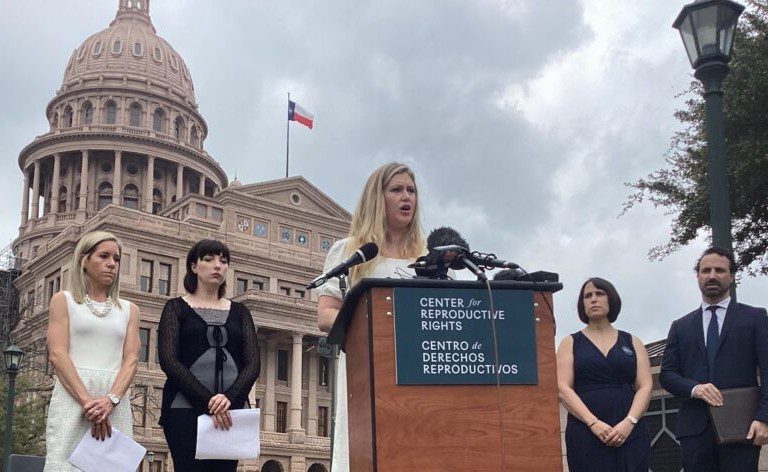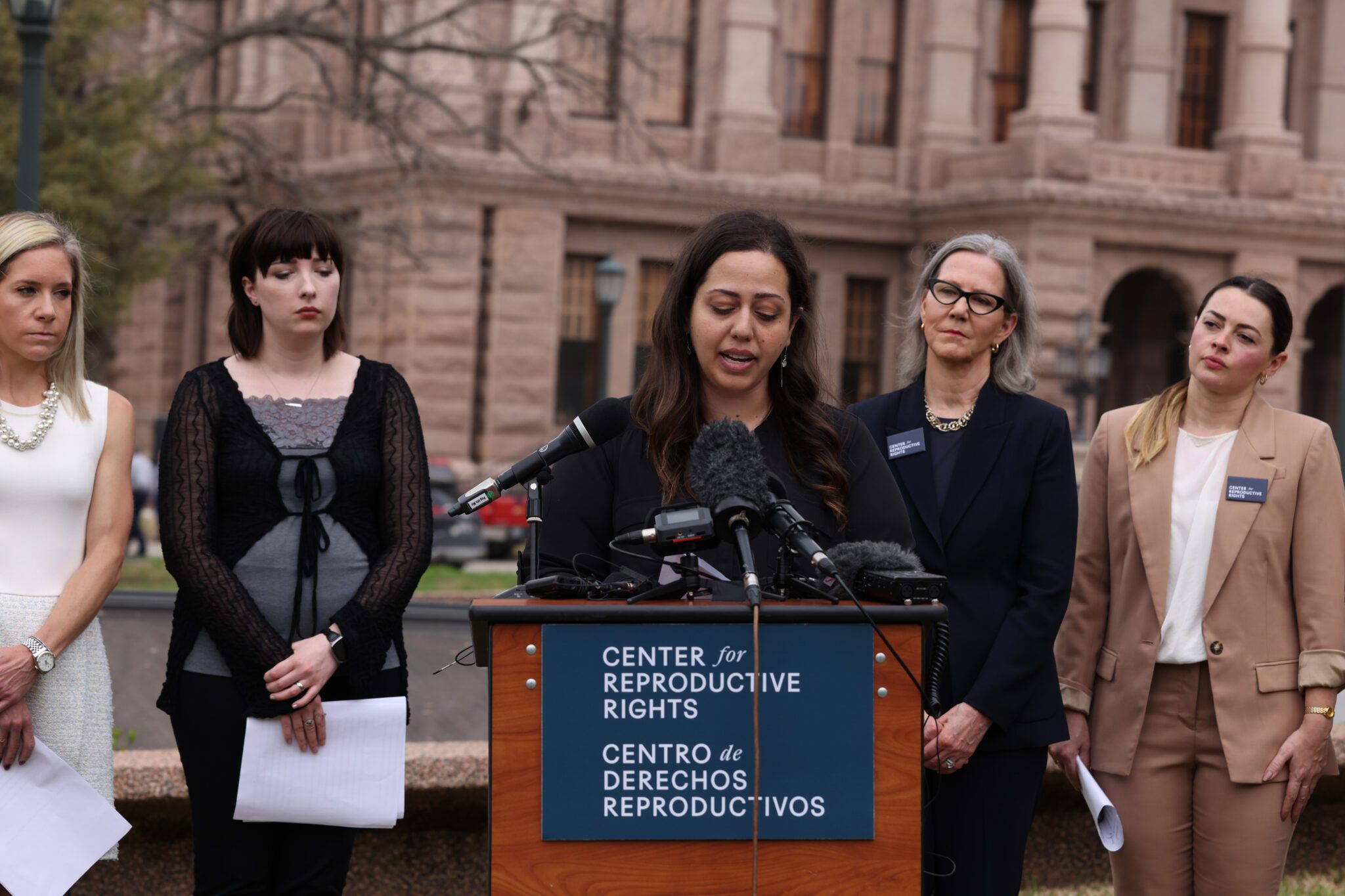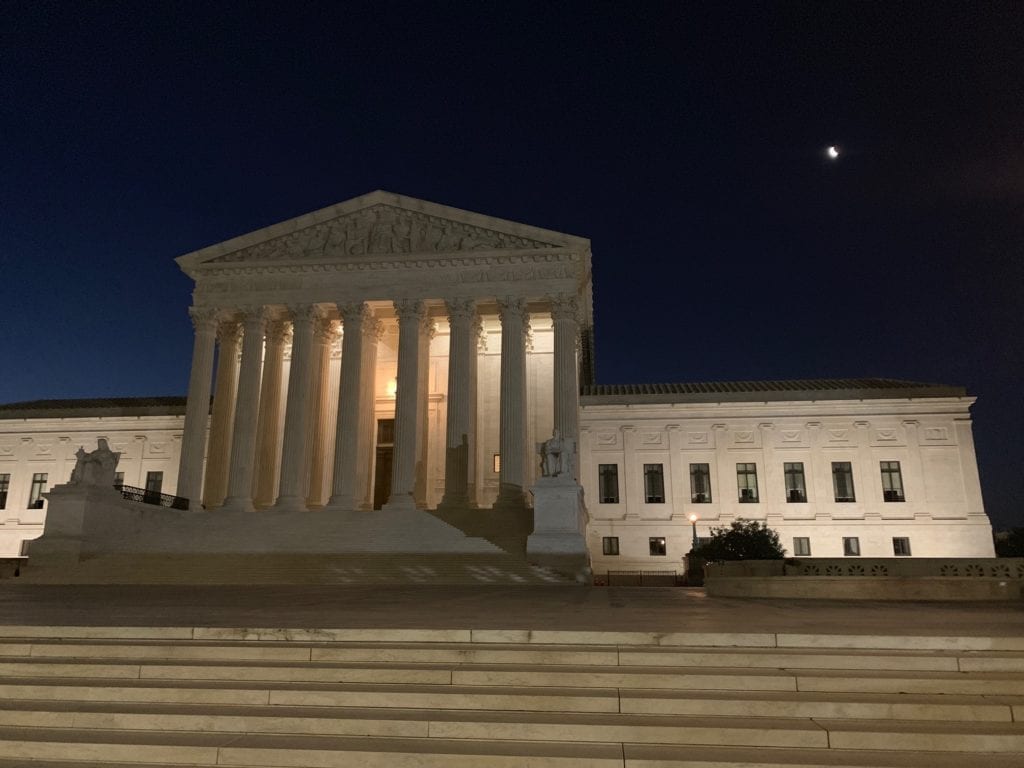Center Sues Texas on Behalf of Women Denied Abortions After Facing Dangerous Pregnancy Complications
As extreme abortion bans cause fear and confusion for patients and doctors, lawsuit seeks to clarify “medical emergency” exception under Texas law.

The Center for Reproductive Rights filed a groundbreaking lawsuit on March 6 against the state of Texas seeking to clarify the scope of the state’s “medical emergency” exception under its extreme abortion bans.
The case was brought on behalf of five Texas women—each denied abortion care after facing severe and dangerous pregnancy complications—and two Texas obstetrician-gynecologists. While the women’s conditions should have qualified under the state’s abortion ban exceptions, they were denied abortions in Texas and their conditions worsened, posing great risks to their fertility, health, and lives.
Read more about the case.
Zurawski v. State of Texas: Complete Case Information
View case details, news, documents, photos and more.
The case, Zurawski v. State of Texas, is the first lawsuit brought on behalf of women denied abortions since the U.S. Supreme Court eliminated the constitutional right to abortion and cleared the way for states to ban it entirely. Since the Court’s ruling in June 2022, 12 states have made abortion illegal and many others have restricted it.
These extreme state abortion bans are creating chaos and confusion for patients and the doctors and hospitals that treat them by criminalizing the provision of abortion, which is a standard, necessary and life-saving procedure crucial in treating many dangerous medical conditions that arise during pregnancy.
As the experiences of the women in this case show, abortion bans such as those in Texas are causing serious harm to people facing severe complications during their pregnancies.
“Texas officials claim the bans they passed protect ‘life,’ but there’s nothing pro-life about them. I nearly died as a direct result of the anti-abortion restrictions in Texas,” said Amanda Zurawski, lead plaintiff in the case. “What’s more, they put the lives of my potential future children at risk, as the damage done to my body has already had a negative impact on my reproductive health.”
Filed in Texas state court in Austin, the lawsuit seeks clarity regarding when doctors can provide abortions under the state’s exception for “medical emergencies” to protect the life and health of the pregnant person.
Texas currently has three abortion bans: a state trigger ban, which completely prohibits abortion; S.B. 8, the “vigilante” law banning abortion after about six weeks of pregnancy; and a pre-Roe criminal ban that multiple courts have said has been impliedly repealed.
“Texas officials claim the bans they passed protect ‘life’, but there’s nothing pro-life about them. I nearly died as a direct result of the anti-abortion restrictions in Texas. What’s more, they put the lives of my potential future children at risk, as the damage done to my body has already had a negative impact on my reproductive health.”
–Amanda Zurawski, plaintiff denied abortion care
While the laws contain an exception for the life and health of the pregnant person, Texas’s hostile abortion landscape has made physicians afraid to rely on the exception out of fear that they will be subjected to disciplinary sanctions, including loss of licensure; civil penalties; or lengthy prison sentences. Such uncertainty gravely endangers the lives, health and future fertility of Texans with severe pregnancy complications who are being denied care that would otherwise have been offered to them.
In asking the court to clarify the state’s abortion bans by creating a binding interpretation of the medical exception, the Center argues that physicians, in consultation with their patients, should be allowed to exercise their good-faith judgment regarding what patients qualify under medical exceptions. Such an interpretation would allow physicians to make decisions about their patients’ care without fear that a prosecutor, jury, or disciplinary board might undermine their medical judgment and imperil their livelihood.
“This is the first lawsuit of its kind. It is the first lawsuit in which individual women have sued a state for the harm that they endured because abortion care has been criminalized in the wake of Roe’s reversal,” said Nancy Northup, president and CEO of the Center for Reproductive Rights. “We are seeking a ruling from the court that clearly permits doctors to provide a pregnant patient with abortion care when in the doctor’s good faith judgment, and in consultation with the patient, the doctor determines that the patient has a medical condition that poses a risk to their life or health. No one should be forced to wait until they are at death’s door to receive healthcare.”
Watch the women tell their stories.
Press Conference, Austin, March 7, 2023
Hear the the plaintiffs talk about their experiences in being denied abortion care in Texas, as well as more about the case from the Center’s Nancy Northup and Molly Duane.
>> Highlights from the press conference about the case held March 7 in Austin:
Doctors Afraid to Act, Even When Lives Are at Risk
Physicians found to have violated Texas’s abortion laws face fines of at least $100,000, up to 99 years in prison, and revocation of their state medical licenses—legal risks that are deterring Texas physicians from providing life-saving abortion care to their patients. As a result, patients in Texas have experienced severe physical harm and mental anguish.
The two physician plaintiffs in the case—both board-certified obstetrician-gynecologists—joined the lawsuit because the Texas bans prevent them from meeting their ethical obligations as physicians and providing the medical care their patients need. Hospitals, doctors, and medical associations in Texas have been asking for guidance, but the state has provided none.
“As an OB-GYN, I have been providing maternal healthcare to Texans for many years. Abortion has always been a critical component of that care. Doctors routinely provide abortions to patients when a dangerous complication arises during pregnancy or when the fetus has a fatal condition,” said Dr. Damla Karsan, a plaintiff in the case. “But since Texas’s abortion bans took effect, my hands are tied in many situations. I’ve had to send patients to other states for abortion care that I could have easily given them right across the street at the hospital. I know most Texas doctors are scared to provide abortions in any circumstances or even say the word abortion. We need clarity on what kinds of patients we can help without losing our license or ending up in jail.”
Zurawski v. State of Texas seeks to rightfully return life-and-death medical decisions to pregnant people and their doctors, rather than leaving politicians and state officials to make those decisions.
“Just imagine how you would feel if you learned you were going to lose your pregnancy, but the state wouldn’t allow you to get the medical care you needed to prevent that pregnancy from threatening your life and future fertility.”
–Molly Duane, senior staff attorney
Pregnant People’s Stories Underscore Danger of Extreme Abortion Bans
The stories of the five women denied abortion in the case exemplify the threats Texas’s bans pose to pregnant people’s lives and make clear that Texans in obstetrical emergencies are not getting the care they need:
- Amanda Zurawski, from Austin, lead plaintiff in the case, was denied abortion care after she experienced preterm pre-labor rupture of membranes (PPROM) at 18 weeks of pregnancy. She was seen at a Catholic hospital in Austin, where she was denied an abortion because her doctors could still detect fetal cardiac activity. Three days later, she showed signs of infection and was diagnosed with sepsis, a life-threatening condition. Although doctors then performed an emergency induction abortion, she spent the next three days in the ICU fighting for her life. She ultimately survived, but the infection caused one of her fallopian tubes to become permanently closed, compromising her future ability to have children. She has been forced to turn to in vitro fertilization (IVF) in attempt to start a family.
- Lauren Miller, from Dallas, was hospitalized at eight weeks of pregnancy for severe nausea, vomiting, and dehydration, and was diagnosed with hyperemesis gravidarum—a condition posing significant risks to the patient and her pregnancy. She also learned at that time she was pregnant with twins. But at 12 weeks, Lauren learned that one of her twins had trisomy 18—a condition that causes multiple structural abnormalities and makes the fetus unlikely to survive to birth. Due to Texas’s abortion bans, doctors denied Lauren a fetal reduction abortion procedure, despite it being necessary to give Lauren and the second fetus the best chance of survival. After being again hospitalized for hyperemesis gravidarum at 15 weeks, she traveled out of state to Colorado to obtain the fetal reduction abortion. Lauren has recovered and is expecting to give birth this month.
- Lauren Hall, from outside of Dallas, discovered at 18 weeks pregnant that her fetus had anencephaly, a condition which prevents fetuses from developing a skull. Her fetus had no chance of survival and continuing the pregnancy posed severe risks to her, including hemorrhage and pre-term birth. Although Lauren wanted an abortion, her obstetrician refused to provide one or to help in any way. In addition, her medical specialist was afraid to give her a referral for an abortion out of state and refused to even send her medical records. Lauren was forced to travel out of state to obtain an abortion at a clinic outside of Seattle. She is now pregnant again, due in September but scared to be pregnant under the state’s laws.
- Anna Zargarian, from Austin, Texas, was 19 weeks pregnant when her water broke and she began cramping. In the emergency room, doctors told Anna there was no chance that her baby would survive and that based on her condition, she was at risk of infection, hemorrhage, and sepsis. Anna was told that she needed an abortion but could not get one in Texas and would need to leave the state. Anna decided to fly to Colorado for an abortion, despite her fear of going into labor on the way. While she still wants to have children, she is afraid to go through pregnancy again in Texas.
- Ashley Brandt, from Dallas, was pregnant with twins but at 12 weeks, learned that one of the twins had acrania—and the longer she stayed pregnant with both twins, the less likely it was that both would survive the pregnancy. Ashley’s doctors told her that because of S.B. 8, she would need to go out of state to obtain a fetal reduction abortion procedure, which she traveled to Colorado to obtain. Back in Texas after her procedure, her doctors were reluctant to acknowledge that she’d had an abortion. For the remainder of her pregnancy, until she gave birth to a full term, healthy baby, Ashley remained terrified for her life and that of her baby.
“Just imagine how you would feel if you learned you were going to lose your pregnancy, but the state wouldn’t allow you to get the medical care you needed to prevent that pregnancy from threatening your life and future fertility,” said Molly Duane, senior staff attorney. “How could anyone stand by, waiting for you to be close enough to death? Lawmakers passing these cruel bans should be asking themselves that question.”
Learn more.
Media coverage: New York Times, NPR, NBC News
See media coverage about the case by The New York Times, NPR, and NBC News.
While some of the women in the lawsuit had the ability and resources to travel out of state to obtain the care they needed, many pregnant people do not—and they are forced to continue dangerous or unviable pregnancies against their will and at severe risk to their fertility, health, and lives. The Center’s complaint cites news reports of numerous pregnant people who have been harmed due to these extreme laws.
“Texas has harmed our clients and is putting more lives at risk every day—and it must be held accountable,” added Duane. “Abortion is a necessary and essential part of life-saving reproductive care—and this case clearly shows that.”
Texas’s Abortion Bans Violate the Fundamental Rights of Pregnant People and Physicians
The Center argues that Texas’s bans put pregnant people’s health, lives, and fertility at risk, violating their fundamental human rights and the Texas Constitution’s guarantees to life, liberty, and equality.
The Center also argues that Texas’s bans violate the rights of physicians by threatening enforcement against those who provide abortions in good faith for pregnant people with severe pregnancy complications. As such, Texas’s bans impede physicians’ fundamental rights, including physicians’ rights to pursue their profession without risking loss of liberty.
The physician plaintiffs in the case are:
- Dr. Damla Karsan, who provides gynecological care, prenatal care, and obstetric care as part of her Houston-based practice. Before Texas’s S.B. 8 law, she provided abortions to her patients in need of such care, but since the law took effect in 2021, she has been unable to provide the care they need. Dr. Karson joined this lawsuit to speak on behalf of other physicians who she knows are afraid to speak out for fear of retaliation.
- Dr. Judy Levison, a faculty member at a medical school in the Houston area. Since S.B. 8 took effect, she has seen how widespread fear and confusion regarding the scope of Texas’s abortion bans have chilled the provision of necessary obstetric care, including abortion care. Dr. Levison partially retired from the practice of medicine in 2022 following the overturning of Roe v. Wade, feeling she could no longer practice medicine the way she was trained and consistent with her ethical obligations as a physician.
Texas’s Abortion Laws
Read more about Texas’s restrictive abortion laws.
The plaintiffs in Zurawski v. State of Texas are represented by the Center for Reproductive Rights and its co-counsel, Morrison & Foerster LLP, and Kaplan Law Firm.
Read the full complaint in Zurawski v. State of Texas here.
View complete case information here, including case details, news, documents, and photos.





